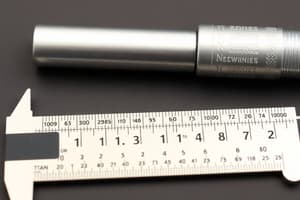Podcast
Questions and Answers
A car accelerates uniformly from rest to a speed of 20 m/s in 10 seconds. What is the acceleration of the car?
A car accelerates uniformly from rest to a speed of 20 m/s in 10 seconds. What is the acceleration of the car?
- 2 m/s² (correct)
- 1 m/s²
- 10 m/s²
- 20 m/s²
Which of the following is NOT a unit of energy?
Which of the following is NOT a unit of energy?
- Kilowatt-hour (kWh)
- Joule (J)
- Watt (W) (correct)
- Calorie (cal)
Sound waves cannot travel through which of the following?
Sound waves cannot travel through which of the following?
- Solids
- Vacuum (correct)
- Liquids
- Gases
A device that converts electrical energy into mechanical energy is called a/an:
A device that converts electrical energy into mechanical energy is called a/an:
What is the basic unit of electric charge?
What is the basic unit of electric charge?
Which of the following statements is TRUE about the atomic nucleus?
Which of the following statements is TRUE about the atomic nucleus?
Flashcards
Fundamental Units
Fundamental Units
Basic measurement units such as meter, kilogram, and second.
Newton's Laws of Motion
Newton's Laws of Motion
Three fundamental principles by Newton describing motion: inertia, F=ma, and action-reaction.
Gravitational Force
Gravitational Force
Attraction between two masses, related to their mass and distance apart.
Work-Energy Theorem
Work-Energy Theorem
Signup and view all the flashcards
Specific Heat Capacity
Specific Heat Capacity
Signup and view all the flashcards
Types of Motion
Types of Motion
Signup and view all the flashcards
Ohm's Law
Ohm's Law
Signup and view all the flashcards
Sound Wave Characteristics
Sound Wave Characteristics
Signup and view all the flashcards
Study Notes
General Science for RRB Group D
-
Units and Measurement:
- Understanding fundamental units (meter, kilogram, second) and their derived units (e.g., area, volume).
- Conversion between different units.
- Significant figures and their importance in scientific measurements.
- Errors in measurement and types of errors (random, systematic).
-
Motion:
- Describing motion using displacement, velocity, and acceleration.
- Graphical representation of motion (distance-time, velocity-time graphs).
- Equations of motion for uniformly accelerated motion.
- Types of motion (uniform, non-uniform, accelerated).
- Understanding concepts like speed, velocity, and acceleration.
-
Laws of Motion:
- Newton's three laws of motion (inertia, force and acceleration, action-reaction).
- Concepts of momentum, impulse, and conservation of momentum.
- Applications in everyday life.
-
Gravitation:
- Understanding universal law of gravitation and its implications.
- Gravitational force, acceleration due to gravity, and its variations.
- Weight and mass.
- Satellite motion.
-
Work, Energy, and Power:
- Definitions of work, energy (kinetic, potential, and total mechanical energy), and power.
- Relationship between work, energy, and power.
- Laws of conservation of energy.
- Examples of different forms of energy and their applications.
- Units of work, joules, work-energy theorem, power in watts.
-
Heat:
- Concepts of heat, temperature, and their difference.
- Specific heat capacity, latent heat, and their applications.
- Methods of heat transfer (conduction, convection, and radiation).
- Different states of matter.
-
Light:
- Reflection and refraction of light.
- Laws of reflection and refraction.
- Different types of mirrors and lenses.
- Formation of images by mirrors and lenses.
- Optical instruments (microscope, telescope).
- Nature of light (wave and particle nature).
-
Sound:
- Nature of sound as a wave.
- Characteristics of sound waves (frequency, amplitude, wavelength).
- Speed of sound in different media.
- Reflection, refraction, interference, and diffraction of sound waves.
- Applications of sound in daily life.
-
Electricity and Magnetism:
- Basic concepts of electricity (current, potential difference, resistance, Ohm's law).
- Series and parallel circuits.
- Simple electrical instruments (ammeter, voltmeter).
- Basic concepts of magnetism (magnetic fields, magnetic materials, electromagnets).
- Electromagnetic induction.
-
Atomic Structure and Structure of Matter:
- Fundamental particles (protons, neutrons, electrons).
- Atomic number, mass number, isotopes, and isobars.
- Bohr model of atom.
- Molecular structure.
- States of matter.
- Mole concept and its applications.
- Elements, compounds, and mixtures.
-
Modern Physics:
- Brief introduction to nuclear physics (radioactivity, nuclear fission, and fusion).
- Concepts of radioactivity, half-life, and its applications.
- Basic idea of radioactivity and the nuclear models.
-
Biology:
- Important biological concepts needed for the exam.
- Basic biological terminology.
- Basic definitions.
- Classification of living organisms.
- Plant and animal cells.
-
Chemistry:
- Fundamental chemical concepts.
- Atoms, molecules, elements, and compounds.
- Basic chemical reactions.
- Conservation of mass and energy.
- Classification of matter.
- Basic periodic table.
Studying That Suits You
Use AI to generate personalized quizzes and flashcards to suit your learning preferences.




